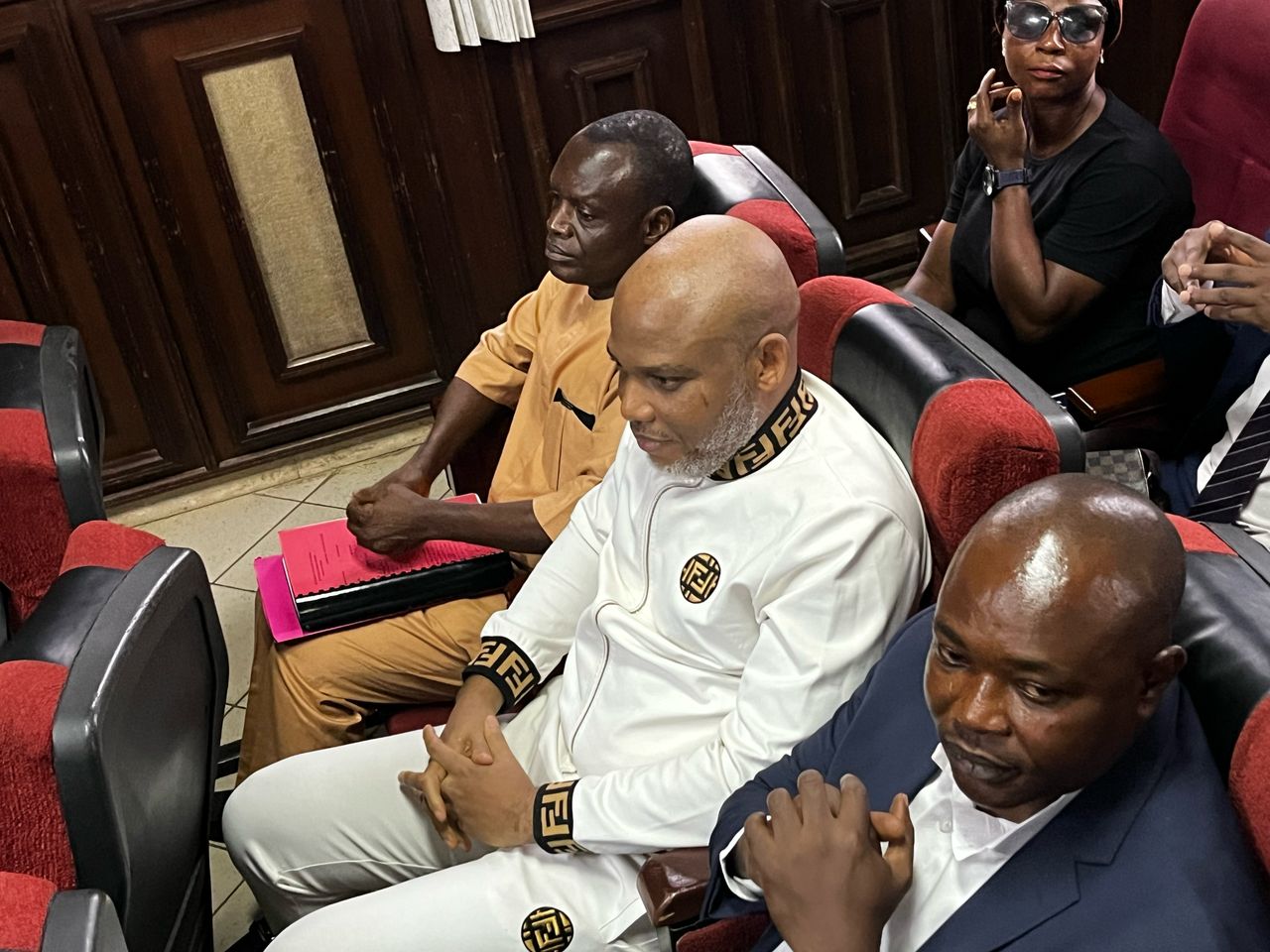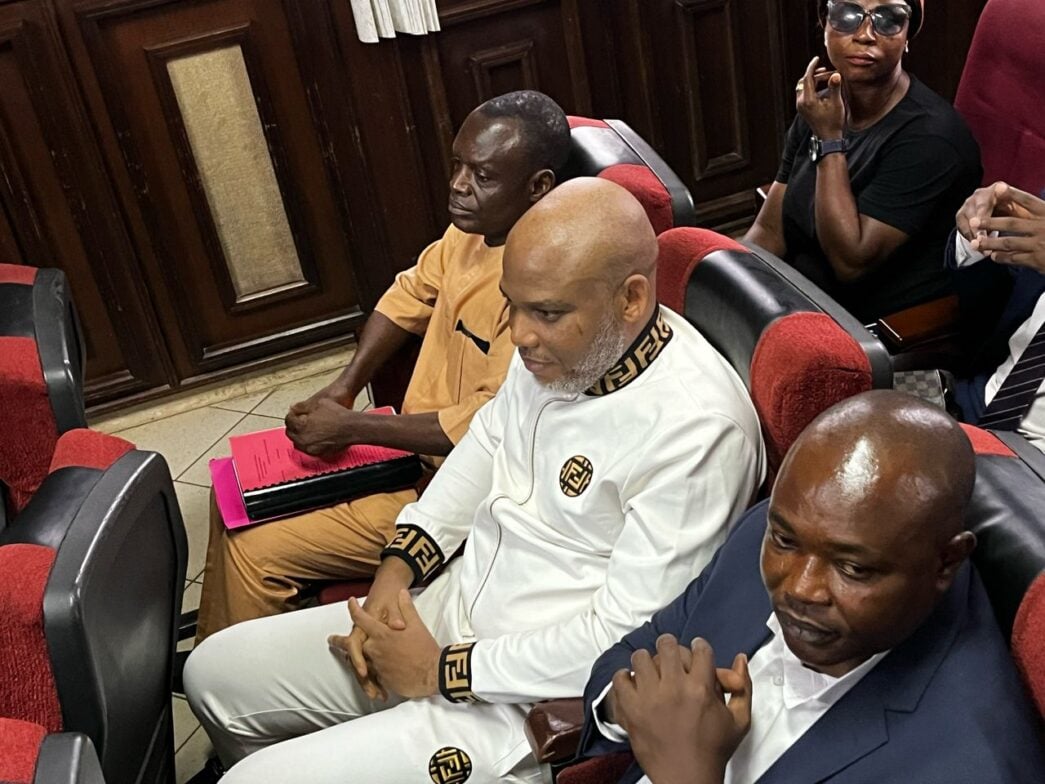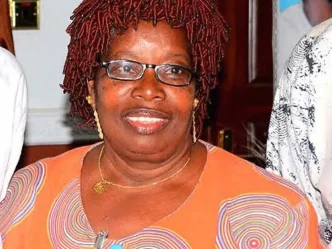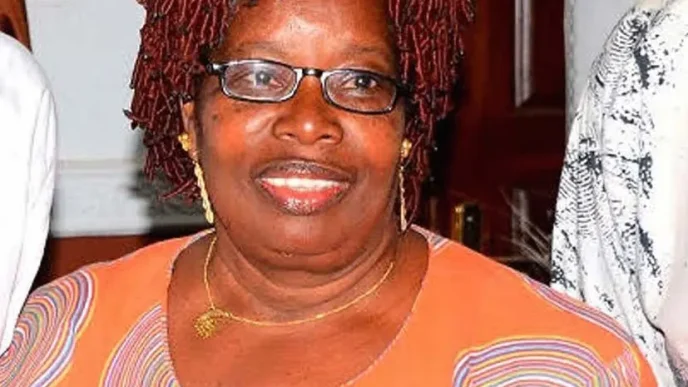Nnamdi Kanu (in white) in court | File photo
The gavel has fallen. Nnamdi Kanu now faces life behind bars, save for his right to appeal. Sokoto becomes his new address for the foreseeable future—thanks to a decision, based on the judge’s counsel, to remove him from the spotlight of the Kuje Correctional Facility in the Federal Capital Territory, Abuja.
The verdict has already ignited heated debates across the South-East and beyond. But let’s cut through the noise: whether one views Kanu as a misguided revolutionary or a dangerous demagogue, his conviction does not silence the deeper cry of marginalisation that birthed his movement. If anything, it amplifies it.
Nigeria cannot, and must not, pretend that the grievances that fuelled the agitation that gave rise to his emergence, have evaporated simply because one man has been sentenced to life imprisonment. That’s not how history works. That’s not how human frustration works. And certainly, that’s not how nations heal.
Kanu did not create the feeling of marginalisation in the South-East; he only capitalised on it. He hijacked a legitimate agitation of the people, and twisted it into something far removed from the ideological blueprint laid out in the storied Ahiara Declaration of June 1, 1969. Ojukwu’s conceptualisation, and articulation of Biafra was rooted in dignity, justice, equity, and the eternal pursuit of self-worth. It’s not the reign of fear, not coercion, and certainly not the economic paralysis that “sit-at-home” mandates brought upon innocent people of the region, every Monday.
Advertisement
By default, the South-East became a region under siege—not by external invaders, but by its own sons acting on the orders of men (Kanu, Simon Ekpa, Ifeanyi Eze Okorienta aka, “General Gentle de Yahoo”) who claimed to speak and fight for the people. From shuttered shops to empty classrooms, from grieving families to shattered livelihoods, the region paid, again and again, the price of a warped ideology masquerading as liberation movement.
And yet, even with Kanu convicted, the story isn’t finished.
We all know, Kanu went overboard with some, if not all, of his public speeches, especially on Radio Biafra, social media, and even at public rallies. As such, one doesn’t have to be a SAN or a Professor Jurisprudence to know that he would be on a collision course with the Nigerian state. Through his terroristic sounding utterances, fear and terapidation became the sound tracks of life across the length and breadth of “Ala Igbo”. His erratic behaviour in the courtroom did not in anyway help his case. But those, combined, is not the focus of this piece.
Advertisement
It’s too easy for Abuja to believe that locking up Kanu equals locking up the discontent. If only nation-building were that simple. The uncomfortable truth is that new demagogues rise when old wounds remain untreated. The vacuum he left behind can still be filled, perhaps by someone louder, angrier, or even deadlier. That is the lesson of history from the Niger Delta to the Middle Belt, from North East to North West, from the creeks to the savanna. When one leader is eliminated, it births dozens more. The elimination of the Boko Haram leader – Abubakar Sekhau, led to the emergence of several other leaders who claim to be his successors. That culminated in the emergence of splinter groups among the terrorist organisation. So locking Kanu up in Sokoto or wherever, without addressing the Igbo cry of marginalisation would amount to treating the symptom, while leaving the disease unattended to.
Here’s the kicker: Nigeria had a roadmap to avoid all of this. It was handed to the nation after the Civil War—the famous 3Rs: Reconciliation, Reconstruction, and Reintegration. Some scholars have added the 4th one – Rehabilitation. A promise that was spoken boldly but implemented poorly. A national healing left half-baked. And when a wound is half-healed, it festers.
The verdict has immediately drawn mixed reactions, highlighting the deep divisions surrounding Kanu’s persona. While some see a dangerous terrorist finally brought to justice, others view him as a passionate advocate for Igbo rights martyred by a system they believe has systematically marginalized them.
Kanu’s conviction has split the Igbo nation down the middle:
• Those who swear by him, seeing in him the embodiment of resistance.
Advertisement
• Those who curse his name, having buried loved ones lost to the bullets of “unknown gunmen” and the terror of ESN renegade, that are believed to be his creation.
Both factions exist. Both are real. And both reflect different scars from the same unaddressed injustice.
But the deeper grievance—the one that births agitation after agitation, is still sitting quietly under Nigeria’s political carpet. Ignoring it now would be an executive masterclass in short-sightedness.
So here’s the bottom line—no corporate jargon needed:
You can imprison a man, but you cannot imprison a feeling. It can only be addressed.
You can convict an individual, but you cannot convict a region’s sense of exclusion.
Advertisement
A comprehensive solution, to address the grievances would involve:
Inclusive dialogue:
Advertisement
The federal government engaging with Southeast governors, traditional leaders, and credible stakeholders like Ohanaeze Ndigbo to address historical grievances.
Economic revitalization:
Advertisement
Implementing targeted programs to rebuild the Southeast’s economy, particularly supporting small businesses devastated by both insecurity and sit-at-home orders.
Security sector reform:
Advertisement
Transitioning from purely militarized responses to community-focused security approaches that rebuild trust between citizens and state institutions. There is also the need to have a multi-level policing system that gives room for response to situations of distress call, in real time.
Truth and reconciliation processes:
Confronting the lingering trauma of the civil war and its aftermath through honest dialogue and acknowledgment of past wrongs. Those who suffered losses of properties, lives and livelihood, during the recent fratricidal war declared on the region through the command of Kanu, Ekpa and General Gentle de Yahoo, must be made to get justice, even if it is posthumous.
Nigeria is once again at a crossroads, the same junction it has arrived at many times before. This moment demands courage—not the chest-beating kind, but the reflective, humble kind. It demands a government willing to listen without dismissing, to engage without threatening, to heal without pretending that nothing is wrong.
Because after all is said and done, the project we are trying to build—call it Project Nigeria, or as some dreamers say, Project Nigeriana—will stand or fall on one simple truth:
No nation moves forward when part of it feels permanently left behind.
And until that truth is confronted head-on, today’s Kanu will only become tomorrow’s new face of agitation.
Abubakar writes from Ilorin, Kwara state. He can be reached via [email protected].
Views expressed by contributors are strictly personal and not of TheCable.





